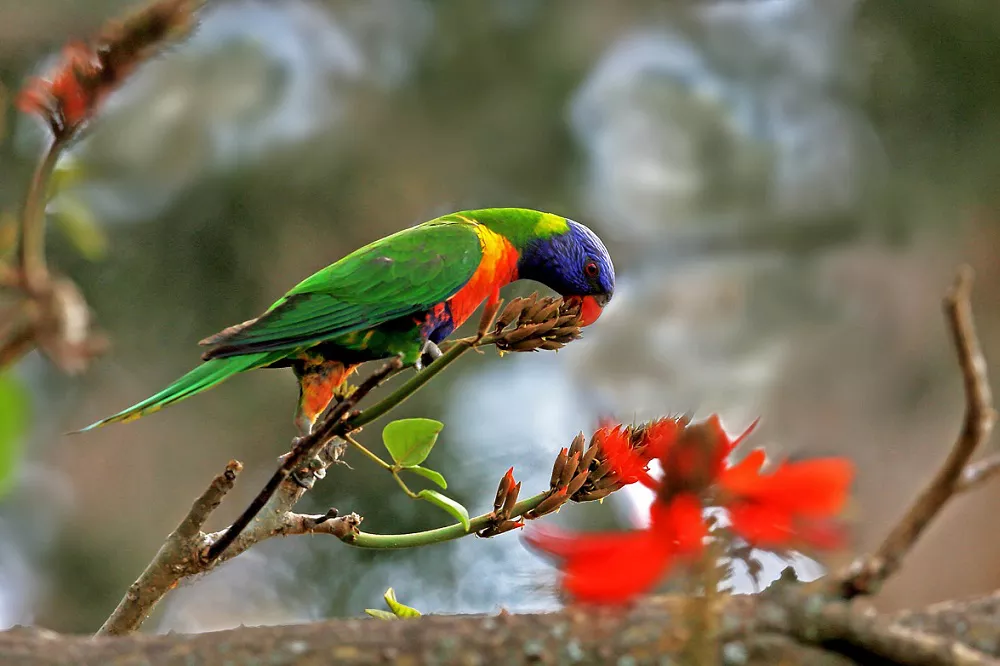Coconut lorikeets (Trichoglossus haematodus) are colorful and charismatic parrots known for their vibrant plumage and playful nature. As avid foragers, these avian wonders have specific dietary needs that contribute to their overall health and well-being. In this article, we delve into the feeding habits and dietary preferences of coconut lorikeets, shedding light on the array of foods they consume to thrive in their natural habitat.
Natural Diet:
In the wild, coconut lorikeets have a diverse diet consisting primarily of nectar, pollen, fruits, flowers, and soft-bodied insects. Their unique brush-tipped tongues and specialized digestive systems are well-suited for extracting nectar from flowers and consuming a range of plant-based foods.
Nectar and Pollen:
Coconut lorikeets are nectarivores, meaning they consume nectar as a significant portion of their diet. They have a remarkable adaptation in the form of a brush-like tongue that allows them to collect nectar from flowers. The nectar provides them with a rich source of sugars, providing energy for their active lifestyle. In addition to nectar, coconut lorikeets may also consume pollen from flowers, which adds essential proteins and micronutrients to their diet.
Fruits and Flowers:
Coconut lorikeets have a strong affinity for fruits, particularly those with fleshy or pulpy textures. They readily feed on a variety of tropical and subtropical fruits, including berries, melons, papayas, figs, and guavas. The consumption of fruits contributes to their intake of essential vitamins, minerals, and dietary fibers.
Furthermore, coconut lorikeets show a fondness for floral parts such as petals, buds, and blossoms. The consumption of flowers provides additional nutrients and compounds, contributing to their overall health and vitality.
Insects and Other Protein Sources:
While coconut lorikeets predominantly feed on plant-based foods, they also incorporate small amounts of insects and other protein sources into their diet. Insects, including beetles, ants, and termites, serve as a supplemental source of protein, aiding in muscle development and providing essential amino acids.
Dietary Needs in Captivity
In captivity, Coconut Lorikeets require a varied diet that closely resembles their natural feeding habits. A balanced diet for these birds should consist of fresh fruit, vegetables, and a specially formulated commercial lorikeet food. This food contains essential vitamins and minerals that are not present in fruits and vegetables alone, such as calcium, phosphorus, and vitamin D3.
Because Coconut Lorikeets are prone to obesity, it is important to limit their intake of high-fat foods such as seeds and nuts. These foods should only be given as occasional treats. Instead, provide your bird with plenty of fresh fruits and vegetables, including leafy greens, carrots, sweet potatoes, and berries.
Feeding Tips for Healthy Coconut Lorikeets
To ensure that your Coconut Lorikeet stays healthy and happy, it is important to follow these feeding tips:
Provide plenty of fresh, clean water at all times.
Offer a variety of fruits and vegetables each day to provide a well-rounded diet.
Limit the intake of high-fat foods such as seeds and nuts.
Avoid feeding your bird any foods that are toxic to birds, such as avocado, chocolate, caffeine, and alcohol.
Remove any uneaten food from your bird’s cage to prevent spoilage and bacterial growth.
Consider providing your bird with a calcium supplement if you are not feeding a commercial lorikeet food that contains added calcium.
Consult with a veterinarian who specializes in avian care to ensure that you are providing your Coconut Lorikeet with the best possible diet.
Conclusion:
Coconut lorikeets possess a specialized dietary profile that revolves around nectar, fruits, flowers, and occasional protein sources. By understanding and providing for their natural feeding preferences, both in the wild and in captivity, we can support the health and well-being of these charming parrots. A balanced diet that incorporates commercial lorikeet diets, fresh fruits, vegetables, and protein sources will help ensure the vitality and happiness of coconut lorikeets in our care.


 Facebook
Facebook  Instagram
Instagram  Youtube
Youtube 